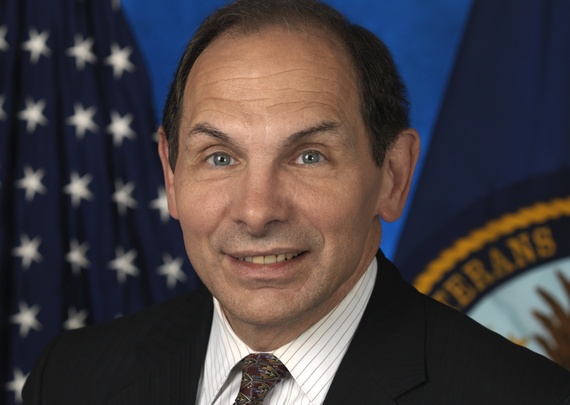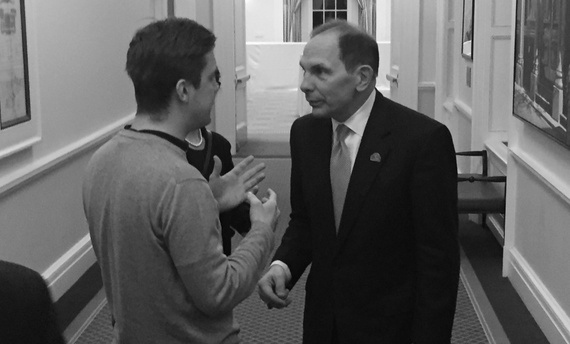When Secretary of Veteran Affairs Bob McDonald visited the Harvard Business School last month, we had a chance to talk to him, following his lecture and introduction by host and Ernest L. Arbuckle Professor of Business Administration Rosabeth Moss Kanter.
During his lecture, inside a packed Spangler auditorium, he addressed students and stressed how important it is to have a purpose. "The one lesson I want to convey to the young people," he said, "Think about what your purpose is, what you want to stand for. Write it down. And follow it in all that you do."
In the interview, McDonald shared his lessons of West Point and CEO of Procter & Gamble and how his expertise from the private sector carries over to the public sector, to lead the U.S. Department of Veterans Affairs. We started with a simple question.
Patrick Daniel: Where did you grew up?
Bob McDonald: I was born in Gary, Indiana. Gary, Indiana is a steel town. I was born in a house that lived right across from the U.S. Steel mill and my father worked in the mill when he came back from the war. Then he went to college under the G.I. Bill. And he worked in Chicago so we lived throughout Chicago and we moved to a suburb in the Northwest of Chicago and that was where I went to West Point from.
Daniel: How did that influence your life and help to become CEO of Procter & Gamble?
McDonald: I think I had a great childhood. I think my parents were very loving and my parents are religious and they gave me values and I think those values have animated my life. Whether that was going to West Point where you have Duty, Honor, Country. Where joining Procter & Gamble Company which has a very strong purpose and set of values. Or agreeing to do this job when the President [Obama] called.
Daniel: How did you translate your value-based leadership and private sector expertise into the public sector?
McDonald: Well, I think the ten leadership beliefs that I talk about and you can find them online, they animate my behavior, my leadership behaviors, no matter whether it's a public sector or private sector. I think the principles are the same, sometimes the execution may be different, depending on the environment and the context. But that's the case when I move from P&G Toronto to P&G Japan to PNG Philippines. You have to operate in a different culture.
Daniel: Could you tell us a little bit more about the "My VA" initiative?
McDonald: Well, it's about re-organizing departments to focus on five things. And I've mentioned those in the talk. First is putting the veteran at the center of everything we do and getting good veteran experience, and good customer service. Second is improving the employee experience, because if we don't improve the employee experience, they don't take care of the veteran. Third is improving our internal support services, which frankly are not very good. Fourth is developing a culture of continuous improvement and we are training everyone in Six Sigma. And fifth is creating strategic partnerships. That will be a force multiplier for caring for veterans.
Daniel: If there was one lesson that you have learned as CEO Procter & Gamble, what would that be?
McDonald: One thing. God gave me two ears and one mouth, which means, I should listen twice as much as I speak. And an example of that was, I was in Japan and we were launching a new product called Febreze, which I know a lot of college students like to use for washing their cloth and two Japanese people working for me said they figured it out. I asked them to explain it to me in English and I didn't get it. I ask them to explain it to me in Japanese and I still didn't get it. And I must have gave them a million dollars or something like that to test the idea in Hokkaido, which is a Northern Island in Japan. It worked and then we expanded throughout Japan and grew the business 35 percent. Then we expanded it. I got promoted to a different role and we expand it globally, grew the business 35 percent. It taught me that I don't always have all the answers and sometimes not speaking and simply listening is the best approach.
Daniel: What is the best advice you have ever received?
McDonald: Choose the harder right instead of the easier wrong. The wrong thing is usually easier to do than the right thing. And you have to force yourself sometimes to do the right thing.
Daniel: When you look back at your life, what was a turning point in your life?
McDonald: I think going to West Point was probably a life changing experience. It amplified the values I already had. It caused me to serve the country. It taught me discipline. It changed my life. I wouldn't be doing this job today probably if I hadn't gone to West Point. It means a lot to me.
Daniel: What do the first two hours of your day look like?
McDonald: I get up about 4:45am and I do two hours of exercise. And I typically read while I exercise, so that's my time. Nobody can take that time from me.
Daniel: Since you are avid reader, what is the book that you are most likely to give out to students?
McDonald: Well, with Rosabeth Moss Kanter here, I have to say SuperCorp. It is a great book. Because it talks about the importance of value and purpose. Stephen Covey's Seven Habits of Highly Effective People is a great book. I could go on. I have a big library. Right now I'm reading a new biography of John Quincy Adams.
Daniel: If you could have dinner with anyone in history, who would you choose?
McDonald: That's a really relevant question because I have always said that the dinner I would like to have is with Henry Kissinger, Lee Kuan Yew and Deng Xiaoping. They were change agents and wise men. And I got to know two of them. I didn't know Deng before he passed away.
Daniel: What did you learn from President Obama during your engagements with him?
McDonald: I think the biggest thing I have learned from him is "choose the harder right instead of the easier wrong." Let me give you an example. During the Ebola crisis, there was a lot of political pressure to stop travel from Africa to the United States. And many politicians succumb to the political and said they would have done it. The President got advice from all the medical experts and the advice was don't do that because then you won't find the people, who are sick. And despite all political pressure, he did harder right and we got Ebola under control.
Daniel: Thank you, Bob.
McDonald: Thank you. My pleasure.
This interview was originally published at The Harbus, the student newspaper of the Harvard Business School.


